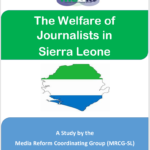By MRCG
It is essential to increase public support and ownership, foster a shared understanding of a common goal, and ensure that transitional justice (TJ) processes are aligned with local needs and aspirations. Every element of TJ, from implementation and assessment to monitoring and evaluation, relies on national leadership. For nationally driven TJ processes to be successful, partnerships—especially at the national level—between beneficiaries and the government, State, and non-State actors are crucial.
Sierra Leone, having endured a brutal civil war (1991–2002) and successfully implementing a Truth and Reconciliation Commission (TRC) and the Special Court for Sierra Leone (SCSL), remains a reference point for transitional justice in Africa. However, further localisation of this AU principle is vital for ongoing peacebuilding and preventing the recurrence of violence. The African Union (AU) Transitional Justice Policy (AUTJP) offers a framework for African nations to address past conflicts and human rights abuses while promoting sustainable peace and reconciliation. One of its core principles, National and Local Ownership, highlights that national and local actors should lead transitional justice processes to ensure legitimacy, effectiveness, and long-term success.










Leave a Reply